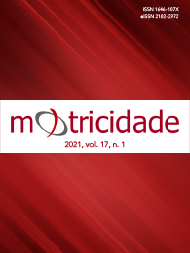Anxiety in female college basketball
DOI:
https://doi.org/10.6063/motricidade.21074Abstract
Anxiety can significantly influence the athlete's performance in the game. The objective of this study was to analyze the trait anxiety and state anxiety related to the competitive situation and correlate it between anxiety and self-confidence variables. Thirty-three college basketball student-athletes (21.61; SD= 2.72 years old) were evaluated using sample characterization questionnaires, SCAT, and CSAI-2 in 3 collection moments (baseline, pre-game, and post-game). The results showed: a) no statistically significant difference in the three moments analyzed in the trait anxiety, with statistically significant correlations with cognitive Anxiety and self-confidence (r= 0.389 e 0-414, respectively); b) in somatic Anxiety, there was a statistically significant difference between baseline, pre-game and post-game levels, with statistically significant correlations with cognitive Anxiety (r= 0.313) and self-confidence (r= -0.511); c) in cognitive Anxiety, there was a statistically significant difference between baseline, pre-game and post-game levels, with significant correlations with self-confidence (r= 0.289). This research, which evaluated Anxiety in competitive situations, makes possible the identification of these variations over time in order to provide important data for the coaching staff, thus improving intervention strategies for the athlete's performance of college sport.
Keywords: Sport psychology, Trait anxiety, State anxiety, College basketball, Student-Athlete.
Downloads
Published
Issue
Section
License
The authors of submitted manuscripts must transfer the full copyright to Journal Motricidade / Sílabas Didáticas Editions. Granting copyright permission allows the publication and dissemination of the article in printed or electronic formats, and copyrights start at the moment the manuscript is accepted for publication. It also allows Journal Motricidade to use and commercialise the article in terms of licensing, lending or selling its content to indexation/abstracts databases and other entities.
According to the terms of the Creative Commons licence, authors may reproduce a reasonable number of copies for personal or professional purposes, but without any economic gain. SHERPA/RoMEO allows authors to post a final digital copy (post-printing version) of the article on their websites or on their institutions' scientific repository.


